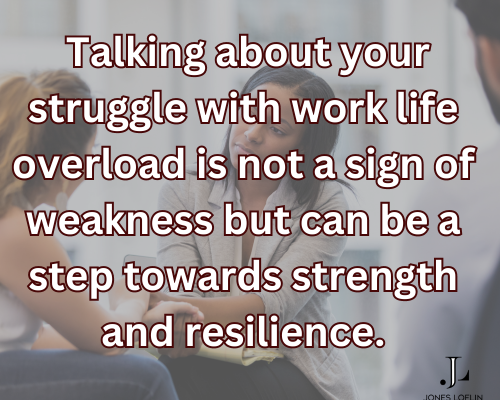3 Powerful Suggestions To Break Free From Work Life Overload
I recently finished a coaching session and at the end I asked the client, “What was most helpful about today?” Their response was, “I got to talk about it.”
So often when we’re experiencing work life overload, the last thing we want to do is to talk about it. We tend to internalize our struggles, believing we must find all the solutions within ourselves. This approach is not only unhealthy but also counterproductive. Holding in feelings of being overwhelmed or stressed can exacerbate the situation, preventing us from discovering potential solutions or gaining new perspectives from others.
Conversely, opening up about our struggles can be incredibly relieving. Sharing our experiences can lead to a sense of validation and understanding, often resulting in the realization that others are facing similar challenges. It relieves that pressure, and you’re probably going to find that the other person is saying, “Wow. You too?”
The fundamental law of human beings is interdependence. A person is a person through other persons.
— Archbishop Desmond Tutu
3 Suggestions to Start A Beneficial Conversation
1. Find the Right Person to Talk To
Begin by identifying someone you trust—someone who has shown empathy in the past and will listen in the way you need them to. This person could be a friend, family member, colleague, or even a professional coach or therapist.
Communicate your needs clearly: if you want them to just listen without offering solutions, let them know. If you prefer they ask questions and provide feedback, make that clear as well.
2. Be Specific About Your Stressors
When discussing your feelings of overload, avoid vague statements like “I’m stressed.” Instead, try to explain the different things that are stressing you and why they are stressing you out, causing you to feel these feelings of overload. Being specific can help the person you’re talking to understand your situation better and offer more targeted support.
3. Bring Potential Solutions
While it may seem counterintuitive to come up with solutions when you’re feeling overloaded, doing so can be incredibly empowering. Even if the solutions are idealistic or only feasible in a perfect world, they demonstrate your willingness to find a way out of your current situation. This approach also signals to the person you’re talking to that you’re seeking constructive help, not just venting. However, when it comes to addressing your work life overload, rarely will all the solutions be found within you.
Oftentimes it helps to look into other resources that can help guide you into asking the right questions such as:
Good vs Essential: Are you spending more time taking care of what is “good” but neglecting what is “essential”?
Are you focused on prioritizing the wrong things?
Have you tried taking the right preventative steps to avoid overload?
Bottom Line
Dealing with work life overload requires more than just internal reflection; it necessitates open communication and a willingness to seek help. By finding the right person to talk to, being specific about your stressors, and bringing potential solutions to the table, you can start the right conversation and take meaningful steps toward alleviating your stress.
You do not have to navigate work life overload alone. Start the conversation today.




